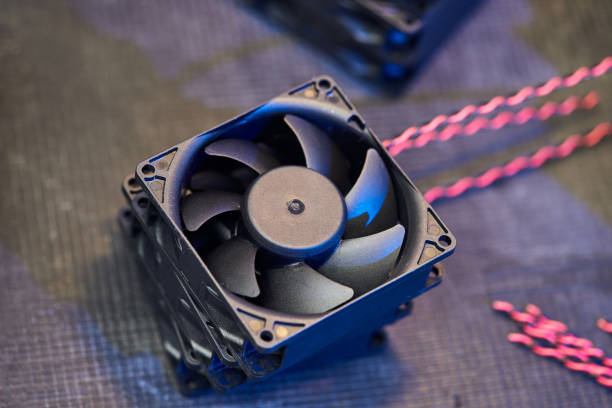The need for EC fans (Electronically Commutated fans) in industrial settings for thermal management has emphasized their performance, efficiency, and adaptability in comparison to traditional AC fans. EC fans, unlike AC fans, come with built-in electronics that enhance speed control, save energy, and enable smarter integration with contemporary control systems.
EC filter fans are finding applications in narrow enclosures and in sophisticated automation systems, and are proving their worth far beyond standard ventilation options in flexibility, reliability, efficiency, and adaptability.
B2B clients are able to optimize operations, minimize expenses, and respond to the rising demands for performance and eco-friendliness with off-the-shelf solutions offered by these EC fans in five unique applications that we discuss in this article.
Advanced Electrical Panel Cooling
The continual push towards increased capability in industrial systems comes with the drawback of increased overheating risks to constituent elements that are critical. Traditional AC fans do not improve the situation as they are designed to run full throttle without load or temperature-based modulation.
EC fans are capable of providing real-time thermal feedback and adjusting the operational speed of the fan, which optimizes the airflow and reduces noise and energy consumption. When used with filter fans EC units, they provide clean and particle-free airflow, which is best for protecting sensitive devices such as PLCs, relays, and circuit breakers from dust and debris.
In control cabinets, B2B integrators prefer EC-based solutions because of their:
- Lower and less intrusive height
- Reduction in maintenance services due to less dust ingress
- Compliance with modern energy-efficiency standards
- Ability to interface directly with building automation systems
High-Density Data Centers
Data centers require powerful cooling systems that need to be responsive to real-time changes of thermal load across server racks. The need for high-performance cooling solutions is not always met by traditional fan designs.
EC fans are unrivaled in this area because of their precision speed control, energy efficiency, low noise, and modular design where airflow control at each rack level is essential.
Benefits of implementing EC fans and filter fans in data centers:
- 30% Reduction in electricity costs
- Improved thermal maintenance increases equipment lifespan
- Redundant configurations and failovers are possible with minimal system disruption
- Easier integration with centralized cooling and monitoring systems
IT infrastructure managers seeking energy efficiency and guaranteed uptime appreciate these benefits, making the EC fans a preferred solution.
Commercial Refrigeration and Cold Chain Logistics
Pharmaceuticals and perishables are classified as temperature-sensitive goods, requiring strict thermal control throughout the supply chain. EC fans are perfectly suited for commercial refrigeration units since they dynamically respond to temperature changes and are more energy efficient during low-load periods.
The effectiveness of EC fans over a wide voltage and temperature range makes them resilient to harsh refrigeration environments. Moreover, their sealed electronics protect them and cold and humid environments, making them ideal for cold chain logistics.
Integrating filter fans ensures that airflow remains clean and dry, which is crucial for preventing frost and microbial contamination. Compared to older conventional fans, EC fans have:
- Improved temperature consistency in cooling unit
- Reduced costs in commercial freezers and transport vehicles
- Quieter operation in retail and foodservice settings
- Decreased emissions and lower power use.
All these advantages contribute to operational efficiency and compliance regulations in the food and pharmaceutical industries.
Cooling Of Renewable Energy Equipment
The renewable energy sector, especially solar inverters alongside battery storage units, require significant thermal management to avoid overheating. Such overheating could substantially lower power conversion efficiency or even damage components.
In this regard, EC fans and filter fans present a smart and scalable option. EC fans are capable of changing their speed according to the temperature sensors ensuring they cool only when needed. Their compact form is beneficial for enclosures with constrained space. Furthermore, their brushless design makes them less prone to failure in remote installations.
The benefits to OEMs and installers include:
- Improved reliability of inverters in solar farms
- Long-lasting inverter reliability with low maintenance
- Reduced total cost of ownership for energy projects
- Adherence to sustainable building standards
Renewable energy system designers achieve performance gains within the envelope and cost targets by employing EC fans instead of standard ones.
Automated Manufacturing Systems
Complex machines like motors, robotic arms, and electrical enclosures are part of modern manufacturing lines that heavily depend on automation systems. These high-performance systems produce a lot of heat and need specific cooling to avoid overheating, operational delays and unproductive workflows.
EC fans stand out in these applications because of their responsiveness to temperature changes and the need for cooling, as well as their compatibility with existing controls. To improve airflow while keeping systems dust-tight, many manufacturers install filter fans along with EC units. This is critical for maintaining cleanliness and protecting the integrity of systems in dusty or abrasive environments like woodworking or metalworking.
What makes EC fans automated settings outperformance:
- Active cooling and advanced fault detection enable reduced downtime
- Modbus, PWM and analog inputs enable intelligent controls.
- Modular equipment can utilize the compact form factor.
- Diminished workplace distraction noise enhances quiet operation.
With features like high-speed adaptability and predictive maintenance, smart factories are able to safeguard their thermal management strategies with EC fan systems.
Conclusion
In the perspective of the five use cases: electrical cabinets, data centers, cold chain logistics, renewable energy, and automated factories, the EC fans ventilation systems have better adaptability, energy efficiency, and increased life span compared to traditional ventilation methods. Moreover, their pairing capability with filter fans makes them the preferred choice to efficiently mitigate clean airflow in harsh operational environments.
For an eco-friendly sustainable solution, EC fan systems provides B2B businesses not simply with operational and performance enhancement but an ideal and intelligent investment that aligns with energy regulations, future energy goals, and evolving industrial standards.
EC fans have, and continue to set the industry standard, with their availability and provide a smarter, sophisticated, and quieter cooling system.





